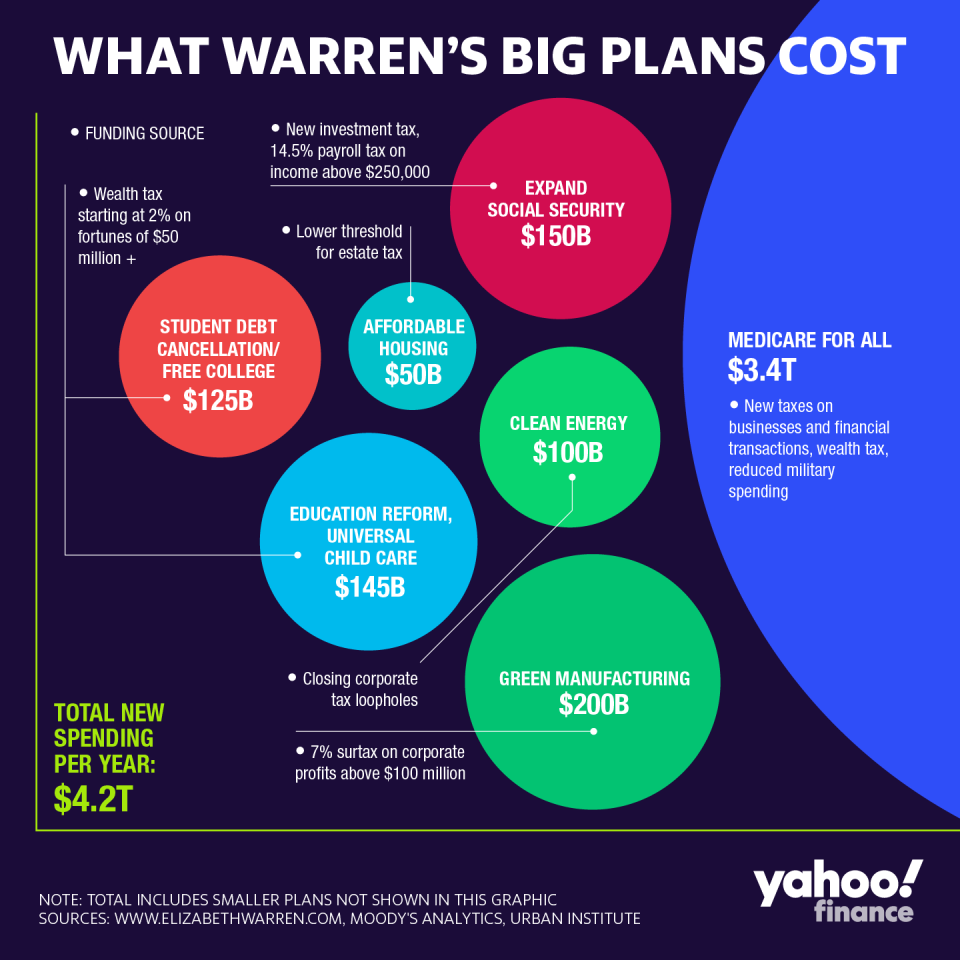Elizabeth Warren might be cratering
Elizabeth Warren is dynamic and brilliant. She’s running a crisp presidential campaign, including the clever (and surely exhausting) populist tactic of posing for selfies with any rally attendee who wants one.
That makes it puzzling that Warren has lashed herself to an impossibly expensive leftist agenda that would require $4.2 trillion in new federal spending per year, if enacted. The biggest chunk of that would be Medicare for all, the government health care program that would eliminate private insurance and cost around $3.2 trillion per year, nearly doubling federal outlays.
Voters impressed by Warren’s energy and intellect now seem to be having second thoughts about her. The latest Quinnipiac poll shows the portion of Democratic voters saying Warren is their first choice cratered from October to November. In October, 28% of Democratic voters said Warren was their first choice, putting her in first place. In the November poll, only 14% chose Warren, putting her in third place behind Joe Biden and Pete Buttigieg.
Another new poll, from CNN, also shows Biden with 28% of the vote, followed by Bernie Sanders with 17%, Warren with 14% and Buttigieg with 11%. While the gap between Biden and Warren is the same in both polls, the month to month change isn’t nearly as pronounced in the CNN poll, where Warren has consistently trailed Biden.

National polls don’t tell the whole story, since a strong showing in early-voting states such as Iowa and New Hampshire can give a candidate momentum that raises their standing elsewhere. Warren is doing considerably better in Iowa, where a variety of polls show that she and Buttigieg are the front-runners, with Biden and Sanders jockeying for the next two spots.
Still, Warren has struggled to win over voters skeptical of the disruption Medicare for all would cause. Among Democrats, there’s more support for an optional Medicare-buy-in plan that would leave private insurance alone than there is for abolishing private insurance and forcing everyone into a government plan. Medicare for all fares even worse beyond Democratic voters. Polling by the Kaiser Family Foundation and the Cook Political Report finds that 62% of all voters in four key swing states say Medicare for all is a “bad idea,” with just 36% saying it’s a “good idea.”
Collossal disruption
If Warren were the Democratic nominee for president, her Republican opponent—presumably, President Trump—would undoubtedly characterize her health care plan as “socialized medicine” and claim she wants to take away people’s health care. That’s not pure propaganda. Health care experts think Medicare for all would lead to a shortage of doctors and other caregivers. It would reduce or eliminate private health care spending, but still require trillions in new taxes. It could also eliminate 1.8 million health care jobs.

Warren recently fudged her support for Medicare for all, unveiling an interim “transition plan” that isn’t as draconian. This plan would be a new optional public health plan for people who can’t get affordable coverage through an employer, which is what Biden, Buttigieg and other moderates support. But Warren would still introduce Medicare for all in the third year of her presidency. So her stance has morphed into leaving private insurance in place for two years, but moving to eliminate it in Year 3 of the Warren presidency. Voters worried about losing insurance aren’t likely to take comfort in a two-year delay.
The whole debate is somewhat silly anyway, because there’s almost no chance Congress would ever vote in a Medicare for all plan that would kill private insurance—even if Democrats controlled Congress and the White House. The disruption would be colossal and voters would revolt. Other Democratic presidential candidates, such as Colorado Sen. Michael Bennet, argue that the United States can get to universal coverage, with insurance for everybody, by plugging holes rather than inventing an entirely new system.
Warren deserves credit for devising thoughtful plans on many important issues and in most cases making an earnest effort to explain how to pay for them. Health care is her Achilles Heel. It’s perhaps the one single issue Democratic voters care most about, and she’s scaring off too many of them with the threat of government overreach. It’s also the one issue where Warren’s math is fishy. Several credible third-party analyses estimate Medicare for all would require upwards of $3 trillion per year in new federal spending. Warren waves a magic wand and says, nah, more like $2 trillion. That’s sneaky and cynical.
Warren may yet recover and make a strong run for the Democratic presidential nomination. But her controversial health care plan is going to get more scrutiny in coming months, not less. And it doesn’t look good under a microscope. Selfies won’t change that.
Rick Newman is the author of four books, including “Rebounders: How Winners Pivot from Setback to Success.” Follow him on Twitter: @rickjnewman. Confidential tip line: rickjnewman@yahoo.com. Encrypted communication available. Click here to get Rick’s stories by email.
Read more:
Read the latest financial and business news from Yahoo Finance
Follow Yahoo Finance on Twitter, Facebook, Instagram, Flipboard, SmartNews, LinkedIn, YouTube, and reddit.

